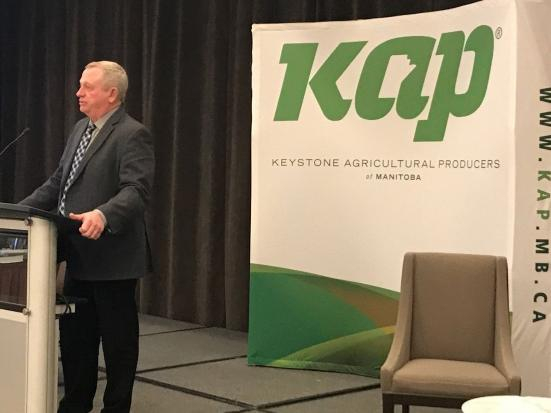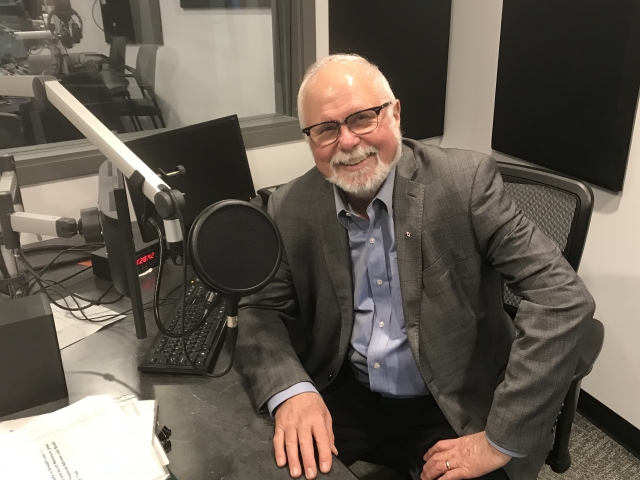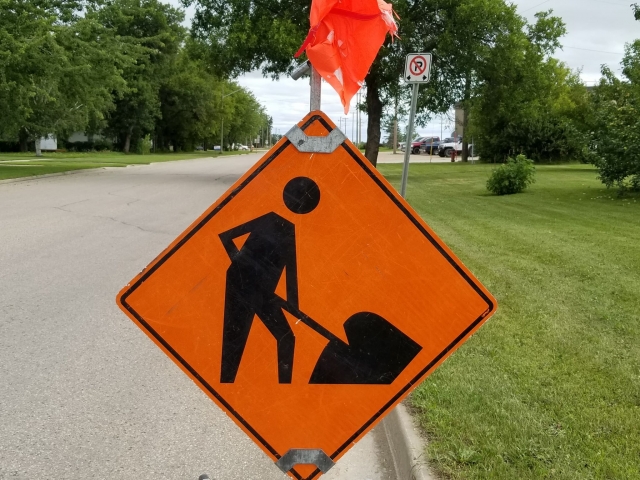 NewsNow
NewsNow
Therae Racette-Beaulieu was in Minnedosa court today for shooting an RCMP officer back in August.
The crown wants the court to give Racette-Beaulieu 20 years for shooting Cpl. Graeme Kingdon in the head. The defence council is arguing for 16 years.
During today's hearing, family members, neighbours, RCMP officers, and the victims gave accounts for how the incident has affected their lives.
The August 29th incident started when Racette-Beaulieu and three others stole a truck, leading to the incident where he shot Cpl. Kingdon.
In January, Racette-Beaulieu pleaded guilty to attempted murder, breaking and entering, stealing firearms, and theft of a motor vehicle.
- Details
- Contributed by Isaac Wihak
Managing time and stress were the big topics at the Breakfast Series this morning.
Being able to manage time will give you more control over your life.
Stephanie Jaddock, training coordinator at Workplace Education Manitoba, says you need to learn how to say no, delegate, prioritize and organize your workday, so you don’t feel like there are too many hours in a day.
To manage your stress, try setting aside a certain amount of time to collect yourself.
You can try anything from taking deep breaths for a minute to exercising for 30 or more minutes.
Jaddock also says to avoid procrastinating, multi-tasking, and to focus on a task for a blocked amount of time to ensure the best outcome.
- Details
- Contributed by Isaac Wihak
Farmers now don’t have to worry about being charged the carbon tax when they get fuel at the cardlock.
Sharmin Rodgerson, from the Gilbert Plains Coop, says they received news this morning that the Carbon Tax exception now included the cardlock.
“There was a lot of farmers upset. A lot of them get their fuel out of there and really trying to figure out what their options were. But that obviously is solved now, hopefully.”
Anyone who filled out their Federal Fuel Charge Exemption Certificate forms don’t have to worry about filling out another one.
“But we do need the people that only pick up at the cardlock are going to have to fill out the form, or they won‘t get the exemption.”
This exemption includes dyed diesel and regular gasoline.
Fuel can be used to do a number of things. “It includes the tillage of soil, livestock grazing or exhibiting, maintaining horses for racing, raising of poultry, fur farming, dairy farming, fruit growing, and keeping of the bees. But, of course it doesn’t include an office or an employment under a person engaged in the business of farming.”
Rodgerson says forms need to be in the computer system by April 1st to avoid paying the Carbon Tax.
The form can be found here.
- Details
- Contributed by Josh Sigurdson
If gambling is destroying you or someone you care about, a new group in Dauphin is here to help.
“We decided that there is need for an anonymity group that deals specifically with gambling. Gambling is a problem that affects people all over the world. Its ruined families, " said an organizer.
The Parkland Gamblers Anonymous Group is planning to hold their first meeting on Tuesday, April 2nd.
“Gambling is an emotional disease, and it is a disease. It’s not just something that we can quit on our own. So through fellowship and through brother and sisterhood, we hope to be able to help people.”
With this group, those suffering won’t need to drive to Brandon or Winnipeg to seek support.
Every Tuesday, at 7:30pm, the group is planning to hold meetings at the Dauphin Friendship Centre.
- Details
- Contributed by Josh Sigurdson
A musician and speaker, is coming to Dauphin to talk about suicide, addiction and mental health.
Cam Bennet, a teacher at the DRCSS, says Robb Nash was last here about 5 or 6 years ago and was fantastic, so when the opportunity to bring him back came up, it’s a win-win for everyone.
1725 high school students from all across the Parkland will be heading over to Credit Union Place on April 25th for the concert.
Bennet thinks the concert will be exciting for the students but will also give them something to think about.
Bennet says it’s key for students to know that they’re not alone, Nash has spoken to students across the country, and it’s okay to have public conversations about these topics with someone they can trust.
- Details
- Contributed by Isaac Wihak
Manitoba's largest farm organization supports a number of the initiatives presented in the recently announced federal budget.
Yesterday’s budget promised to add new money to existing investments to make high-speed internet access in rural communities a reality. President Bill Campbell says KAP has long called for this.
“It’s my understanding between $5 billion and $6 billion will be added in order to improve connectivity to over 900 communities in Canada with more than 200,000 kilometres of advanced fibre networks,” he said. “This will help farmers who are now limited in the innovative technology they can access because of poor internet service.”
Campbell says another positive in this year’s budget is support for farmers in the supply-managed sectors who were forced to give up market share under the recent new trade agreements. These sectors include dairy, poultry and eggs. The $2.15 billion announced will help them address income losses.
Campbell also noted the federal government has committed to look at the exemptions on farm fuel.
“When the carbon tax was announced, we were told there would be an exemption on farm fuel,” he said. “However, we recently we found out that only fuel delivered to the farm is exempt, but not that accessed from a cardlock system. This system allows farmers to get fuel from unmanned fuel stations, which is often more efficient.”
KAP will also continue to lobby for carbon tax exemptions on fuels used for grain drying, and heating and cooling of farm buildings, because these taxes will add very considerable amounts to farm expenses.
- Details
- Contributed by Josh Sigurdson
Right at the start of April, women aged 18-23 will be headed to Ottawa for Daughters of the Vote.
Daughters of the Vote is a program that brings women from all over Canada to represent their community and sit in their respective MP’s seat in parliament.
Alicia Kubrakovich has been chosen to represent her home town, Dauphin, even though she’s going to school at the U of M in Winnipeg.
She’s excited to have the opportunity to go to Ottawa for the program.
She’s looking forward to meeting other indigenous women leaders, meeting the NDP, and talking in the House of Commons about the Missing and Murdered Indigenous Women.
Kubrakovich wants to have her voice heard.
Kubrakovich is the indigenous rep at the University of Manitoba and is running for co-president of the U of M Indigenous Association. She wants to use what she learns in Ottawa to teach new students at the U of M.
- Details
- Contributed by Isaac Wihak
The federal government is bringing in more money than forecast but is spending all that and then some, projecting a 19.8-billion-dollar deficit for the 2019-20 fiscal year.
“Today’s deficits are tomorrow’s taxes. Debts and deficits are something we should try to eliminate as much as we can or minimize,” said Robert Sopuck, MP for Dauphin—Swan River—Neepawa. “ The kind of spending that they’re doing will really not be effective in terms of helping citizens out.”
Canada’s finance minister says the government has to deal with a growing concern that good jobs won’t last. Sopuck thinks it has more to do with the economic headwinds what are the most concerning.
“If you look at some of the economic forecasts, Canada is sailing into some very difficult economic waters. We heard recently how the Chinese are restricting canola imports. That’s affecting our local western rural communities. So again, a prudent budget builder, so-called, would budget in a conservative manner and prepare for the worst. This budget simply didn’t do that.”
Sopuck does support some items in the budget including helping workers transition into a new economy.
“I think that the new economy is something that is really going to help us in western Canada. For example, high-speed internet allows people to work from home. But the amount of money that they are talking about is very, very small. I mean 870 million over five years, that’s simply not a lot of money to train enough people. That’s right across the country. So, it’s a small amount of money for something that I think is actually a good idea.”
The budget also proposes help for first time home buyers. ”Anything to help young people buy homes is a good thing. And again, when I look at the housing situation across Canada for example, housing is becoming clearly unaffordable for many of our young folks. So anything that can be done to help them buy houses is a good thing.”
The budget also takes the first steps toward a national pharmacare plan by creating a new Canadian Drug Agency aimed at reducing the cost of drugs.
Yesterday’s federal budget is the last one before the upcoming election in October.
- Details
- Contributed by Josh Sigurdson
A program similar to Dauphin-At-Risk-Teen is being formed to help adults work better with agencies around town.
The adult program is called Restart, and it’s going to help those aged 18 to 29.
“The objective is to reduce recidivism, basically no longer engaging in negative behaviours. That’s where we see hopefully, if the client is involved in this, a reduction in vandalism, petty crime, truancy with school, better family relationships, it depends on what the need of the client is, but those are the essential ones.”
Lori Bicklmeier is hoping to start April 1st once the reporting requirements for Justice are confirmed.
Through planned approached clients will set goals, plan steps to reach those to refrain from further involvement in problem behaviour.
“I think it would be important to know that it’s not an overnight fix. It’s something that is ongoing, and the clients that we have in our program have multiple complex issues that can go back a long way.” Bicklmeier continues, “Our goal is to continue to support these individuals in bettering their own lives so they can be healthy contributing members to their community.”
Some clients may have been involved with the youth program. This program’s specific criteria mandates they have involvement with a policing agency, the courts, and be already on a probation order.
- Details
- Contributed by Josh Sigurdson
The Crisis Prevention Task Force has been created by Randy Daley.
He says they’re just a group of 16 people that represent different agencies and organizations.
They have two sub-committees working on the agency directory and promotion.
The Task Force is here to create a conversation about things that are happening in the community and being a part of the solution.
The meth crisis and poverty issues are some things they want to pay attention to.
Daley also wants people to be aware of those that are already trying to find a solution to the problems.
If you are an agency, organization, or want to join you can call Alison Moss at Neighbourhood Renewal at (204) 622-3171.
- Details
- Contributed by Isaac Wihak
The provincial government will be distributing 10 million dollars into operation funding for rural municipalities.
The money is for ongoing critical infrastructure needs.
Municipalities don’t have to apply for the funding.
The money will be given out based on population. Municipalities with a population of fewer than 2 thousand people get $37000, 2-5 thousand gets $61,500, a population of 5001-10000 receives $138500, and 246000 dollars is given to a population of over 10001 people.
Payments will be given out on March 31st, July 31st, and September 30th.
The funding can be used for projects starting anytime during the construction season or can be held in reserve for a number of years to complete larger projects, allowing municipalities to efficiently plan for future infrastructure needs.
The funding is unconditional, meaning it can be used for any projects at any time and stacked with any other funding from the government.
This isn’t the only way the provincial government is supporting municipality infrastructure needs. There will be support by provincial and federal funding through the Investing in Canada Infrastructure Program, an additional $2 million invested in the Manitoba Water Services Board budget for municipal water and sewer infrastructure, and the provincial sales tax decrease, estimated to save municipalities outside of Winnipeg $1.3 million per year.
- Details
- Contributed by Isaac Wihak

















